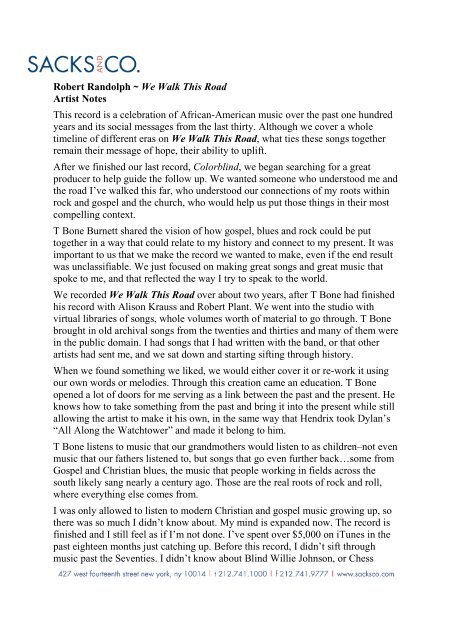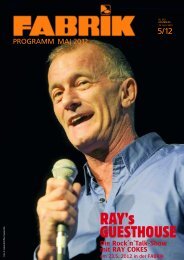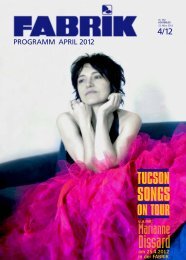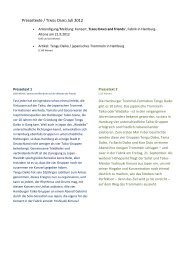You also want an ePaper? Increase the reach of your titles
YUMPU automatically turns print PDFs into web optimized ePapers that Google loves.
Robert Randolph ~ We Walk This Road<br />
Artist Notes<br />
This record is a celebration of African-American music over the past one hundred<br />
years and its social messages from the last thirty. Although we cover a whole<br />
timeline of different eras on We Walk This Road, what ties these songs together<br />
remain their message of hope, their ability to uplift.<br />
After we finished our last record, Colorblind, we began searching for a great<br />
producer to help guide the follow up. We wanted someone who understood me and<br />
the road I’ve walked this far, who understood our connections of my roots within<br />
rock and gospel and the church, who would help us put those things in their most<br />
compelling context.<br />
T Bone Burnett shared the vision of how gospel, blues and rock could be put<br />
together in a way that could relate to my history and connect to my present. It was<br />
important to us that we make the record we wanted to make, even if the end result<br />
was unclassifiable. We just focused on making great songs and great music that<br />
spoke to me, and that reflected the way I try to speak to the world.<br />
We recorded We Walk This Road over about two years, after T Bone had finished<br />
his record with Alison Krauss and Robert Plant. We went into the studio with<br />
virtual libraries of songs, whole volumes worth of material to go through. T Bone<br />
brought in old archival songs from the twenties and thirties and many of them were<br />
in the public domain. I had songs that I had written with the band, or that other<br />
artists had sent me, and we sat down and starting sifting through history.<br />
When we found something we liked, we would either cover it or re-work it using<br />
our own words or melodies. Through this creation came an education. T Bone<br />
opened a lot of doors for me serving as a link between the past and the present. He<br />
knows how to take something from the past and bring it into the present while still<br />
allowing the artist to make it his own, in the same way that Hendrix took Dylan’s<br />
“All Along the Watchtower” and made it belong to him.<br />
T Bone listens to music that our grandmothers would listen to as children–not even<br />
music that our fathers listened to, but songs that go even further back…some from<br />
Gospel and Christian blues, the music that people working in fields across the<br />
south likely sang nearly a century ago. Those are the real roots of rock and roll,<br />
where everything else comes from.<br />
I was only allowed to listen to modern Christian and gospel music growing up, so<br />
there was so much I didn’t know about. My mind is expanded now. The record is<br />
finished and I still feel as if I’m not done. I’ve spent over $5,000 on iTunes in the<br />
past eighteen months just catching up. Before this record, I didn’t sift through<br />
music past the Seventies. I didn’t know about Blind Willie Johnson, or Chess
Records. I thank T Bone for being a tour guide into the deepest parts of my musical<br />
roots.<br />
We connected the last one hundred years of African-American music in the way<br />
people used to: You write your own songs, you cover other people’s material, you<br />
re-work older songs. We had some amazing people come in to help. Leon Russell<br />
came by to hang out and wound up playing piano on the last track, “Salvation.”<br />
Ben Harper plays guitar and sings on “If I Had My Way.” The base of that song<br />
came from Blind Willie Johnson, and it was really difficult to get right. It was a<br />
country tune for a while. I had honestly given up on it. But Ben came down and<br />
said, “Let me get in there! I know just what to do!” He went in there and smoked<br />
the choruses, and I thought, “Now we’ve got a tune.” It’s one of my favorite songs<br />
on the record.<br />
Where We’ve Been<br />
I grew up in the House of God church. The pedal steel was a big part of our church<br />
tradition. I grew up watching older guys play, and I started playing when I was<br />
fifteen. When I was nineteen, someone gave me tickets to a Stevie Ray Vaughan<br />
concert. After that, I wanted to play pedal steel like Stevie Ray played his guitar. I<br />
wanted to take another path than the people who played traditional pedal steel to<br />
take it to a whole new level.<br />
We started playing and touring around New York City in 2000, playing clubs like<br />
Wetlands, and things started to take off. We were selling out large New York clubs<br />
with no record deal, and it started to spread to Philly and Boston. Soon, we signed<br />
to Warner Brothers, and word began to get around about us nationally. Great artists<br />
like Eric Clapton and Dave Matthews and B.B. King accepted us. Young artists,<br />
too: we toured with the Roots and Pharrell and John Mayer. We have been<br />
fortunate to be accepted by a wide range of fan bases, and we have been able to<br />
build from there. I definitely feel as if everything has been working up to this<br />
moment, to this record.<br />
Where We’re Going<br />
I’m very excited to play these tracks live. Those people who have been our fans<br />
and followers should see the progression from our last record to this one, and the<br />
road we’ve taken won’t seem too foreign to them. When people come to see us,<br />
they know that it’s really about the message, about making them feel good.<br />
Hopefully, this record will inspire them in the same way. It certainly makes me<br />
feel happy. I can’t see myself recording depressing lyrics, lyrics that leave people<br />
without a sense of hope. It’s not in me to use the power of the microphone to make
music like that. That’s why this record is uplifting - it’s got great messages. It’s all<br />
there.<br />
My goal is to open the door for people, in the same way that musical doors have<br />
been opened for me. I want to take this musical history and make it relevant to give<br />
people a better idea of who I am and where I came from. I think even though I’m a<br />
young guy who was born into the era of hip-hop and contemporary gospel, I can<br />
help bridge the cultural gap between people who are seventy-five years old and<br />
kids who are fifteen years old by reaching back into this history of music.<br />
We Walk This Road was done in our belief in what we all need right now: young<br />
voices saying something positive without preaching in hopes of inspiring people.<br />
When you stick to what you believe in, and with the roots of where you come<br />
from, things will always work out.<br />
For more information, please contact Mary Moyer, Brendan Gillen or Carla Sacks,<br />
at Sacks & Co., 212.741.1000, mary@sacksco.com, brendan.gillen@sacksco.com or<br />
carla@sacksco.com.






